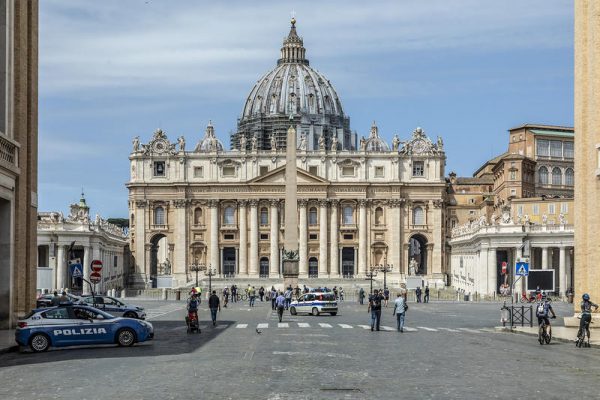Shock at the Vatican Secretariat of State, new perspectives in the Curia

The draft of the delayed document that will reform the Roman Curia gives the Vatican Secretariat of State a more prominent place in the functioning of the central government bureaucracy of the Church. But during the year 2020, Pope Francis moved in the opposite direction.
In fact, in the space of a few months, the Secretariat of State was progressively stripped of all its financial powers.
In September, the Pope appointed the new commission of cardinals of the Institute for Religious Works (IOR), also known as the "Vatican bank". For the first time, the Secretary of State was not among the cardinals. Nor is the Secretariat of State represented on the Commission for Confidential Matters that the Pope established in October with the first Vatican procurement law. In November, the Pope decided that the Secretariat of State would transfer all of its funds to APSA, the equivalent of a Vatican central bank.
In December, Pope Francis specified how the handover should take place, clarifying that the Secretariat of State will be under the constant supervision of the main supervisor of the Vatican's financial operations, the Secretariat for the Economy, which has been renamed the "Papal Secretariat for Economic Affairs. "
These moves are in direct contrast to the Roman Curia's draft constitution, Praedicate Evangelium, which continues to be revised by the Council of Cardinals.
The draft of the document in fact proposes the establishment of a real "papal secretariat" within the Vatican Secretariat of State, which would take the place of the private secretariat of Pope Francis and coordinate the various organs of the Roman Curia. The papal secretariat, for example, convenes periodic interdicasterial meetings and also brings together the dicasteries to work on specific tasks or projects when necessary.
If Praedicate Evangelium essentially remains as it appears to be in the draft circulated last summer, then the piecemeal reforms introduced by Pope Francis will render the new regulations old and obsolete as soon as they are promulgated.
If, on the other hand, the draft is heavily modified to fit what Pope Francis did, then Praedicate Evangelium will not see the light of day anytime soon. Instead, it will continue to be under scrutiny for an even longer time, putting the Church in a state of "reform as you go".
In other words, rather than putting reforms in stone with a binding document like Praedicate Evangelium, as previous popes did, the reforms will come through the personal decisions of Pope Francis, which repeatedly overturned his previous ones.
This is why the path of the curial reform has been characterized, up to now, by many as back and forth.
First, it was the Secretariat for the Economy that saw its powers shrink.
Initially, Pope Francis understood Cardinal George Pell's reformist ideas and advocated a significant recast of financial control mechanisms. The first phase began with the establishment of the Secretariat for the Economy in 2014.
But in 2016, Pope Francis embraced the cause of the Secretariat of State, which argued that Cardinal Pell's approach to financial reform did not take into consideration the particular nature of the Holy See as a state, not as a corporation. Opposing views turned into a struggle when the Secretariat for the Economy signed a contract for a massive audit with Pricewaterhouse Coopers. The revision contract was signed in December 2015 and resized by the Holy See in June 2016.
After reducing the scope of Cardinal Pell's audit, the Secretariat of State has regained its central role in the Roman Curia, while the Secretariat for the Economy has been weakened. When Cardinal Pell had to take leave in 2017 to return to Australia and face notorious charges, of which he was later acquitted, the work of the Secretariat for the Economy was halted.
Pope Francis has appointed Fr. Juan Antonio Guerrero Alves to replace Cardinal Pell in November 2019. Under Fr. Guerrero, the Secretariat for the Economy has regained power and influence. At the same time, the Secretariat of State became embroiled in the scandal following the purchase of a luxury property in London.
With the decision to take any financial control from the Secretariat of State, the pope has returned to his original vision of a strong Secretariat for the Economy. The Secretariat of State has lost all sense of autonomy since its financial operations are now transferred to APSA. Now, every financial move by the Secretariat of State falls directly under the Secretariat for Economic Supervision.
The transfer of funds to APSA seems to recall Cardinal Pell's project for Vatican Asset Management. APSA, like the Vatican Central Bank, has become the central office for Vatican investments.
So far, after the latest papal moves, the Secretariat of State is the only Vatican department with a former financial autonomy that has lost it. Pope Francis' decision has not yet involved the Congregation for the Evangelization of Peoples - which manages, among others, the huge funds for World Mission Day - and the Administration of the Vatican City State, which also have autonomy financial.
But many Vatican observers agree that no dicastery can now consider itself safe from Pope Francis' reform in motion, since the pope has already shown himself ready to change direction unexpectedly, and to do so very quickly. In the Vatican there is already talk of "a state of permanent reform", indeed of the definitive one that should have arrived with Praedicate Evangelium.
Meanwhile, dicastery activities are at a standstill as Curia members wonder if the Curia reform document will ever be published. The Secretariat of State is the first victim of this situation. But it will most likely not be the last.